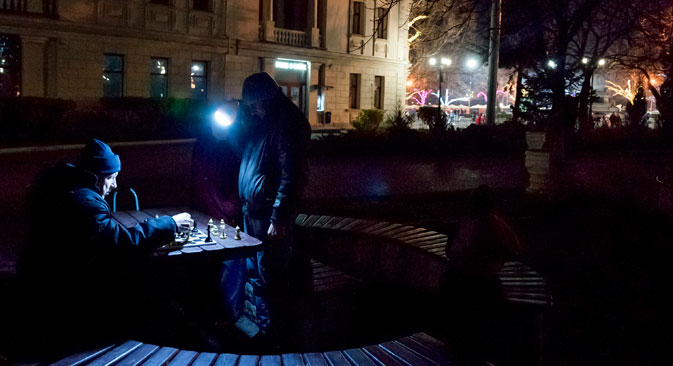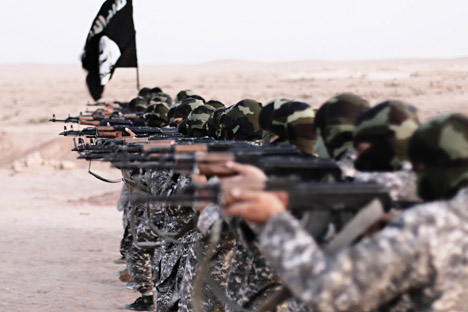Press Digest: Turkey seeks peace with Russia but backs Tatars in Crimea

People play chess holding a flashlight near Nakhimov's Square in Sevastopol, Crimea, Dec. 27.
APAnkara reconciles with Moscow verbally, but backs activists in Crimea
Russian President Vladimir Putin has refined sanctions against Turkey, while Deputy Prime Minister Arkady Dvorkovich has announced their expansion, writes the centrist daily Nezavisimaya Gazeta.
Meanwhile, Turkish politicians have stated that they hope to end the crisis in relations with Russia, and “prayed for the lifting of sanctions,” writes the publication. But these words of peace have been undermined by Ankara's provocative actions in Crimea.
Last week, one of the organizers of the energy “blockade” of Crimea, Lenur Islyamov, said that Turkey is helping the Crimean Tatars, and it will also assist in the formation of a Crimean Tatar volunteer battalion in Ukraine called Noman Çelebicihan.
Experts doubt that Ankara is really aimed at restoring ties with Moscow.
"I think that the crisis between the two countries is deepening," Anna Glazova, deputy director of the Russian Institute of Strategic Studies, said in an interview with Nezavisimaya Gazeta.
"There are several reasons. Turkey continues to support radical Islamists in Syria, and to buy their oil. Turkish leaders continue to adhere to the policy of overthrowing the legitimate government in Syria. Now there is another aspect, which is very alarming – Ankara's support of various subversive groups that operate in Crimea," she said.
Morgan Stanley analysts closest to target in 2015 forecast
The daily broadsheet Izvestiya has checked the accuracy of the forecasts of experts, analysts, investment companies and banks, as well as officials from a year ago.
American investment bank Morgan Stanley gave the most accurate prediction for the ruble in a forecast published in late January 2015. According to it, the dollar was to amount to 72 rubles at the end of 2015.
Morgan Stanley, apparently, guessed the rate, but its projections for oil prices – $55 per barrel before the end of the year – were clearly wrong.
According to the bank's new forecast for 2016 (published this month) the dollar will account for 73 rubles at the end of next year, with the price of oil at $55 per barrel.
Of those who made the biggest mistakes, Sberbank head German Gref stands out. According to his forecast, announced on Dec. 12, 2014, the dollar exchange rate was to be set at around 48 rubles by the end of 2015.
"At the beginning of the year [2015], the dollar will stand at around 55-56 rubles, and in the end, it will cost much lower, maybe 48 [rubles]," he said.
The world's largest investment bank Goldman Sachs turned out to be the most accurate in determining the ruble's average annual exchange rate.
In mid-January, the bank predicted that the ruble's average annual rate against the dollar would be 60 rubles in 2015 (according to the Central Bank, the average rate of the dollar in the 11 months of 2015 amounted to 59.90 rubles).
In its review of the best trading strategies for 2016 published in November 2015, Goldman Sachs recommended investors to buy dollars for euros and yen, as well as to invest in rubles and Mexican pesos; according to GS, these currencies will strengthen.
Court sentences 2 women to prison for financing ISIS
The Moscow District Military Court has handed out a sentence to Yelena Arshakhanova and Saida Khalikova for funding militants of the Islamic State (ISIS) terrorist group, writes the online newspaper Vzglyad.
"Yesterday, the case was heard under a special procedure at the request of the defendants and their defense, with the sentence being carried out on the same day," said the court's spokeswoman.
"Arshakhanova was sentenced to five years and three months in a penal colony, Khalikova was sentenced to five years and six months in a penal colony."
The spokeswoman said that both defendants repented of their actions and asked the court to hear their case under a special procedure, without studying the evidence.
According to investigators, the women produced homemade soap and sold children's clothes.
A campaign was organized on one of the websites to raise funds, which were intended to finance the militants.
As Khalikova claimed at the end of the investigation, she transferred the resulting funds not to ISIS, but to "Muslim youth in need." The court, however, did not heed these arguments.
Read more: How a Russian straight-A student fell victim to Islamic terrorists>>>
All rights reserved by Rossiyskaya Gazeta.
Subscribe
to our newsletter!
Get the week's best stories straight to your inbox

